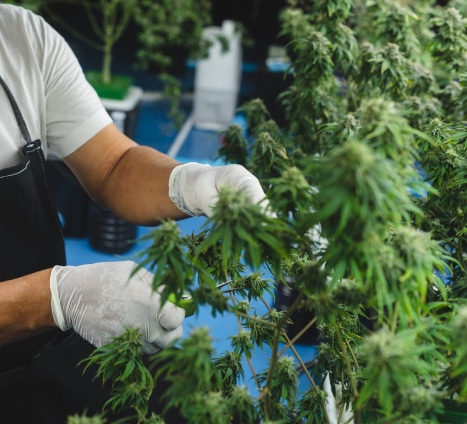How to Get a Cannabis License in Michigan
By Eric Schneider, a seasoned cannabis industry expert. He’s a sought-after speaker at industry seminars and a regular writer for respected cannabis journals such as the American Bar Association


Navigating the Michigan cannabis market requires understanding its unique regulatory framework. This guide, tailored for cannabis entrepreneurs and businesses, provides an in-depth overview of obtaining a cannabis license in Michigan, a state with a rapidly evolving cannabis industry.
Michigan’s cannabis industry is regulated under the Michigan Regulation and Taxation of Marihuana Act. The Michigan Marijuana Regulatory Agency (MRA) oversees the licensing process, ensuring industry compliance and regulation within the state.
How to Obtain a Cannabis License in Michigan?
Comprehensive Research and In-depth Preparation
Market Analysis
Understand the dynamics of Michigan’s cannabis market through industry reports and market data analysis. Assess growth trends and the competitive landscape after the Michigan medical marijuana program was introduced to identify opportunities and challenges unique to the state.
Consumer Insights
Research consumer preferences (medical marijuana patients’ requirements), buying habits, and demographic trends in Michigan. Utilize surveys, market studies, and existing data to align your business strategy with customer needs.
Regulatory Proficiency
Regularly review legislative updates and engage with legal experts specializing in Michigan’s cannabis laws. Participate in regulatory workshops and seminars to stay informed about any changes that could impact your business.
Competitive Analysis
Evaluate Michigan’s cannabis industry’s competitive landscape. Identify key players and their strategies, and understand their strengths and weaknesses.
Site Selection
Choose your business location carefully, considering Michigan’s zoning laws, market accessibility, and community impact. Assess local demand, transportation links, and competitor proximity.
Risk Assessment
Identify financial, regulatory, and operational risks in Michigan’s cannabis market. Develop strategies to mitigate these risks, including insurance and contingency planning.
Network Building
Establish a network of industry contacts, advisors, and potential partners. Participate in Michigan’s cannabis industry events and online forums.
Develop a Solid Business Plan
Business Concept and Strategy
Draft a comprehensive business plan outlining your business concept, goals, and strategies. Describe your target market and how your business will cater to customer needs in Michigan’s cannabis market.
Financial Projections and Marketing
Include detailed financial projections, such as start-up costs, revenue streams, and profitability forecasts. Develop a marketing strategy to attract and retain customers.
Assemble the Necessary Documentation
Legal and Compliance Documents
Gather all required legal and compliance documents for the cannabis license application in Michigan. Ensure accuracy and completeness of business registration documents, tax records, and operational plans.
Submitting the Application
Application Process
Familiarize yourself with Michigan’s procedures for cannabis license applications. Ensure your application is comprehensive and meets all regulatory requirements.
License Renewal and Agent Card Requirements
Understand the renewal process for your cannabis license in Michigan. Be aware of agent card requirements and employment limitations in the industry.
Payment and Fees
Understanding Costs
Prepare for costs associated with applying for a cannabis license in Michigan. This includes the application fee, initial licensure fee, renewal fees, and other potential charges.
Financial Planning
Budget accordingly for these fees, ensuring your business plan accounts for these expenses.
Application Review and Compliance Inspection
Compliance Standards
Ensure your application and business operations comply with Michigan’s regulatory standards. Be prepared for compliance inspections.
Inspection Readiness
Organize your facilities and operations in line with state regulations, including security and product handling protocols.
Post-Application Steps
Application Tracking
Monitor the status of your application post-submission. Maintain regular communication with the regulatory body.
Response to Queries
Respond promptly to any additional information requests from Michigan’s Marijuana Regulatory Agency.
Types of Medical Marihuana Facilities License in Michigan
1. Cultivation License
Details:
Medical Marijuana Grower Licenses focus on growing and harvesting medical marijuana plants, catering to small-scale growers. An Excess marijuana grower license allows large-scale growers to expand the cap on the number of cannabis plants a typical additional medical grower licenses allows.
Requirements:
Businesses with grower licenses must demonstrate knowledge of cultivation techniques and comply with Michigan’s environmental and agricultural regulations.
2. Processor License
Details:
Intended for businesses that transform raw cannabis into products like edibles, oils, and concentrates.
Requirements:
Must provide operational plans detailing processing methods and compliance with health and safety standards.
3. Distributor License
Details:
Allows for the transportation and wholesale selling of cannabis products to a marijuana dispensary in the State.
Requirements:
Applicants need logistics plans and must comply with state laws on transportation and handling.
4. Retail Cannabis Dispensary License
Details:
Authorizes the direct sale of cannabis products to consumers with medical marijuana cards.
Requirements:
Must comply with local zoning laws and have security and customer verification systems.
5. Microbusiness License
Details:
Designed for small-scale operations managing cultivation, processing, and retail.
Requirements:
Requires a comprehensive business plan showing capability across all operations.
5. Nursery License
Details:
Specializes in the cultivation and sale of cannabis seeds, clones, and young plants.
Requirements:
Must demonstrate horticultural expertise and comply with agricultural standards.
Each of these marijuana licenses, including those for adult use cannabis establishments, comes with its own set of challenges and responsibilities. It’s crucial to stay updated with the ever-evolving regulations and the licenses issued, especially those related to adult use cannabis, by regularly checking the official Michigan government pages. As the cannabis industry in Michigan continues to flourish, ensuring compliance and understanding the nuances of each business license and type will pave the way for a successful venture.
Risk and Compliance Factors From AlphaRoot
The cannabis industry, while burgeoning with opportunities, is not without its complexities and inherent risks. Understanding and mitigating these risks is crucial for long-term success. AlphaRoot, a prominent insurance and risk management firm specializing conduct business in the cannabis sector, sheds light on the key risk and compliance factors
1. Regulatory and Legal Risks
Labyrinthine Regulations The cannabis industry is highly regulated, and compliance with state and local laws is paramount for cannabis establishments. Navigating the intricate web of regulations, which can vary significantly from one jurisdiction to another, poses a substantial challenge for cannabis establishments. Failure to comply can result in fines, license revocation, or legal consequences.
Federal Ambiguity Cannabis remains illegal at the federal level in the United States, despite state-level legalization of recreational marijuana. This dichotomy creates uncertainties and exposes businesses that sell recreational marijuana here to potential federal enforcement actions.
2. Financial Risks
Cash-Intensive Operations Due to federal banking restrictions, many cannabis businesses operate primarily in cash. This not only presents security risks but also complicates financial management and taxation.
Taxation Challenges Cannabis businesses face unique tax challenges, including limitations on deductions and potential audits. Understanding and complying with tax regulations is essential to avoid financial penalties.
3. Security Risks
Theft and Robbery Cannabis businesses are susceptible to theft and robbery due to the high value of their products. Implementing robust security measures at a marijuana cultivation facility, including surveillance systems and secure storage, is vital to mitigate these risks.
Cybersecurity As with any industry, cannabis businesses are vulnerable to cyberattacks. Protecting sensitive customer data and business information is critical.
4. Product Liability and Quality Control
Product Liability Claims Ensuring the safety and quality of cannabis products is crucial to prevent product liability claims. Contaminated or mislabeled products can lead to legal and financial repercussions.
Testing and Quality Assurance Collaborating with reputable independent testing laboratory and facilities, as required by regulations, is essential to verify the safety and potency of cannabis products. Consistent quality control is essential to maintain consumer trust.
5. Market Competition and Volatility
Saturated Markets in regions with a high concentration of cannabis businesses, competition can be fierce. Navigating market saturation requires effective differentiation and marketing strategies.
Price Volatility The price of cannabis products can fluctuate significantly, impacting profitability. Businesses must adapt to market dynamics and price changes.
6. Environmental and Sustainability Concerns
Resource Intensity Cannabis cultivation and processing can be resource-intensive, including water and energy consumption. Businesses need to address sustainability concerns and adhere to environmental regulations.
Waste Management Proper waste disposal and recycling practices are essential to minimize environmental impact and meet regulatory requirements.
7. Talent and Workforce Challenges
Talent Shortages the cannabis industry often faces challenges in recruiting and retaining qualified personnel due to its specialized nature. Employee turnover can disrupt operations.
Training and Compliance Businesses must invest to ensure employees are well-informed about compliance and safety protocols.
Expert Insights
Isaac Bock, a well-known figure in the cannabis sector, emphasizes that success in Michigan’s cannabis industry hinges on keeping cannabis establishment of regulations, maintaining ongoing community involvement, and upholding the highest standards of product quality.
FAQ Section
1. What are the costs associated with obtaining a cannabis license in Michigan?
The costs for obtaining a cannabis license in Michigan vary depending on the type of license. Application fees range from $4,000 to $40,000, with additional costs for annual regulatory assessments which can range from $10,000 to $66,000. It’s important to also consider the costs associated with compliance, facility setup, and operational expenses.
2. Can I own multiple types of cannabis licenses in Michigan?
Yes, in Michigan, it is possible to own multiple types of cannabis licenses. However, there are specific regulations governing the combination of licenses one can hold. For instance, licensees are prohibited from holding a grower license and a processor license simultaneously unless they also hold a retailer or microbusiness license. Always check current regulations for the most accurate information.
3. How long does it take to obtain a cannabis license in Michigan?
The timeframe for obtaining a cannabis license in Michigan can vary significantly based on the type of license, completeness of the application, and the Marijuana Regulatory Agency’s (MRA) processing times. Generally, it can take several months to a year from the application submission to license approval. The MRA’s efficiency and the applicant’s readiness to meet all requirements play crucial roles in this timeline.
Additional Resources
Visit the official websites of regulatory authorities and learn of the ever-evolving marijuana landscape in Michigan.
Conclusion
Obtaining a cannabis license in Michigan is an involved process requiring thorough preparation and strategic planning. Entrepreneurs who understand the regulatory landscape and market needs can successfully navigate the cannabis industry in Michigan.